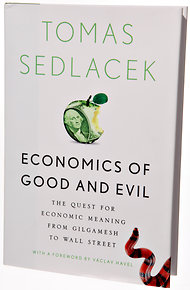All Business Tutorials>Small Business Entrepreneurs
Economics of Good and Evil
AS sophisticated and mathematical as economics has become, it is ultimately a cultural phenomenon and cannot be free of ethics. So argues the Czech economist Tomas Sedlacek, who aims to humanize this most public and powerful of the social sciences.
Richard Perry/The New York Times
In “Economics of Good and Evil: The Quest for Economic Meaning From Gilgamesh to Wall Street” (Oxford, $27.95), Mr. Sedlacek takes mainstream economics as his clay, digging both his arms in up to the elbows in an attempt to explain the beliefs and ethical values underlying modern economics.
At the get-go, Mr. Sedlacek, who was once an adviser to Vaclav Havel, the former Czech president, and is now chief macroeconomist at the big Czech bank CSOB, argues that all of economics is, in the end, about good and evil. He adds: “Even the most sophisticated mathematical model is, de facto, a story, a parable, our effort to (rationally) grasp the world around us.”
Only in the late 18th century, he argues, did today’s concept of economics emerge as a mathematical science. Before then, he says, economics lived within myths, religion, theology and philosophy. Mr. Sedlacek sets out to investigate these origins and to reflect what they might mean for the discipline today.
It is a big, rambling quest, and he yanks his readers along through economic perspectives, practices and meanings in the Old Testament and early Christianity, and in the writings of Plato, Aristotle, Descartes and others.
There are interesting insights along the way. Consider the story in Genesis in which Joseph interprets the pharaoh’s dream of seven fat and seven lean cows. The dream, Joseph tells the ruler, means that seven years of abundance will be followed by an equal period of poverty and famine. Joseph advises the pharaoh to store food during the boom, in preparation for the dearth.
Unexpectedly, Mr. Sedlacek identifies this as the “very first historic economic cycle” and calls Joseph’s advice a form of “Keynesian anticyclical fiscal policy.”
Mr. Sedlacek devotes a fair bit of attention to unpacking the origins of the “invisible hand.” This metaphor, one of the most powerful in economics, is usually attributed to Adam Smith. In “The Wealth of Nations,” Smith put forward the idea that the interaction of individual self-interest, supply and demand in a free market produces economically beneficial results for society.
[img]https://tenco.pro/wp-content/uploads/2014/01/Free-Download-All-Tutorials.png[/img]
[quote]
http://filetut.com/bmt5qbyvm0p1/Economics_of_Good_and_Evil_(2011).rar.html



